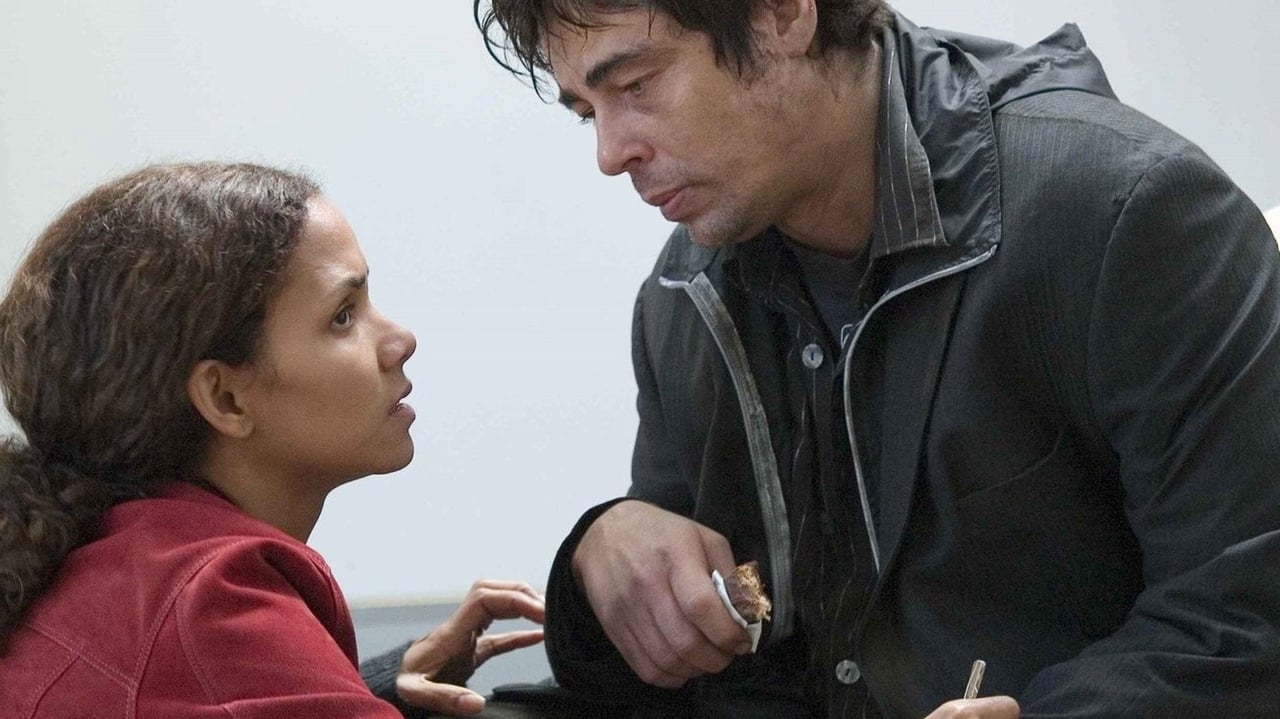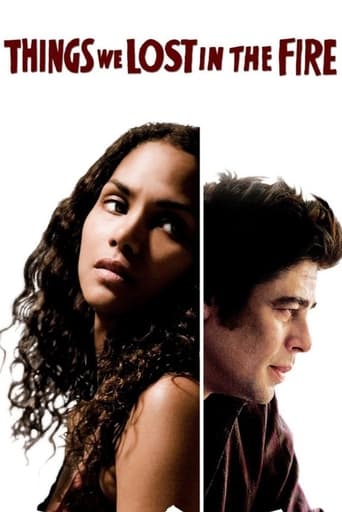Solemplex
To me, this movie is perfection.
SincereFinest
disgusting, overrated, pointless
Huievest
Instead, you get a movie that's enjoyable enough, but leaves you feeling like it could have been much, much more.
Billie Morin
This movie feels like it was made purely to piss off people who want good shows
Narrow
Susanne Bier's 2007 movie, Things We Lost in the Fire sees Halle Berry as Audrey Burke, a recently widowed woman, who enters into an unexpected relationship with a figure from her late spouse's life. If that sounds at all familiar, it's because there are definite parallels to Berry's 2001 Oscar winning turn in Monster's Ball.With a looming awards season around the corner, it's possible that the studio considered this to be another contender to show off Ms Berry's acting prowess. Following rolls in the likes of Die Another Day, Gothika and her Razzie winning performance in Catwoman, it had perhaps escaped the film watching populous' attention that under some bad career choices, there lies a very capable actor. Bier's film falls short of Oscar bait, but it doesn't have the feel of a film that's desperately trying to be worthy. There's a subtly genuine tone to the performances in the film. What could easily be over sentimentalised, Lifetime drama is a well-handled and compelling tale of love, loss, grief and recovery.Benicio Del Toro performance as Jerry Sunborne, the deadbeat heroin addict whom everyone gave up on, except Burke's late husband, is well nuanced. The depiction of drug addiction is neither overly graphic nor monstrous, or apologist. It's commendable that Bier has taken a subject and showed a more accurate depiction. Those recovering from addiction can be intelligent, educated and liked people. They can be the person next door, or the person who walked past you who in the street and appear to be very average. This criminality of the drug use is most certainly the focus.The building relationship between Sunbourne and his late friend's family is also well restrained. While the temptation might be to create an awkward love interest, the focus is more of the bonds that can be created through shared grief. Despite its themes, the film maintains an optimistic that only occasionally drifts into soppy sentiment.It's far from a perfect affair. The performances from the children will take you out of the drama. They're often clumsy and there's a delivery in many of the lines, which seems far too rehearsed. Do children ever really speak like that? Bier's non-linear story telling is also inconsistent, seemingly dropped half way through the film. The relationship between Sunborne and Brian Burke (adequately performed by David Duchovny) doesn't quite seem believable either, but that's partly because he's too thin a character. The film starts to loose coherence when it comes to the larger story. However, the two central performances and character dynamics are strong enough to win this around.
SnoopyStyle
Brian Burke (David Duchovny) is best friend to junkie Jerry Sunborne (Benicio Del Toro). When Brian dies, Jerry tries to help Brian's wife Audrey (Halle Berry) and children. Audrey tries to break Jerry's habit. Alison Lohman plays a recovery friend, and John Carroll Lynch plays a friendly neighbor.Danish director Susanne Bier brings a European sensibility. It's an unsettling series of emotional chaotic melodrama. Benicio Del Toro puts in a heart breaking performance. Halle Berry is playing a confused mess. It can be very slow especially in the first half. It settles down to a sad recovery for everyone.
eric262003
I had high expectations when I saw "Things We Lost in the Fire", Partially because I am a huge fan of Halle Berry and the story structure looked at the most quite intriguing. Sad to say, it failed to give us a rich, deeply emotional story and that's where I deduct several points. Editing, production and a better script could have made this movie ten times more better than what was given to us.The story is set in the present times with well-timed flashbacks in the background to keep the story in tact. Halle Barry plays the role of Audrey Burke, a single woman with two daughters. Her husband Brian (David Duchovny) was tragically killed. From the flashbacks we are informed that Brian's friend from childhood Jerry (excellently portrayed by Benicio Del Toro) were still close even in adulthood only Jerry is now a heroin addict and that Brian has helped him throughout his ordeal by paying him a visit regularly and to provide groceries to him, much to the annoyance of Audrey who felt concerned about Brian visiting Jerry because of the bad side of town in which Jerry lives.In the complexity of Audrey's stems from two possibilities. It could be whether she wants to hang on to her husband's memory or just a simple need for attention, Audrey takes Jerry under her wing to help him overcome his addiction as she invites him under her roof and lets him sleep in her garage which is like a studio apartment in which she repetitively reminds us of "stuff that was lost in the fire" and Brian kept on constantly reminding her "we didn't lose each other and that's the most important" that's how the title came about.Audrey's multi-layered personification is to say the least comes across as at times unusual and at times self-centred as she makes unorthodox demands for Jerry like making him rub her ear lobes so that she can go to sleep at night. The scene itself makes me want to cringe in anger, I mean it was okay that she invited Jerry and be a part of her family, but also refuses Jerry to come anywhere close to her children. I guess this just adds to the complexity of her character. Sure it's nice that she wants to fill in her husband's void to get this dude on the straight and narrow, but for him to resort to force him into rubbing her ears is just overdone and lacks any believable traits to the story.On the whole the performances were quite impressive, but the dialogue feels contrived to the extent that we get the feeling that director Susanne Bier's been watching several episodes of Dr. Phil with the continual saying rubbed in our faces that we must "take things one day at a time". The whole psychology of the film makes the subject matter saccharine and superficial. To me this whole predicament makes me very uncomfortable and insults my intelligence for that matter. The kids are offered stereotypical ridiculous lines like the one daughter who screamed at Jerry accusing him for "taking over her father's place." Sure broken families are everywhere, but I don't think children really talk this way. If I talked that way to my dad I would have been grounded. It's only just people assuming how kids would react in those kind of situations. The reaction I got shocked me and angered me at the same time.If you thought the script was appalling, the direction does not fare any better. Miss Bier assumes that in-your-face close-ups of one's eyes springs emotions and artistic merits or any kind of importance. I was wondering, why the eyeball close-ups? Does she have some kind of strange eye fetish or something? There was nothing significant to it at all. It didn't make the movie any more better. It just wandered off like a lost sheep. The only good thing about the direction is that Miss Bier did was that she let her performers utilize their acting chops even though the material given to them was scarce and not very satisfying. In addition the flashbacks were handled with care and set them at the right time and it was quite informative and compelling.Although I ranted more than I raved I still give this movie a six out of ten. The acting was sublime, the subject of the matter holds one's interest, and Halle Berry turns in a brilliant performance even through her complex nature. Sadly the editing, the script and the directing brought the film down which had a lot of potential going for it. I still recommend those who want to see it, and I hope that if you see it you won't be upset with all the faults that come with it.
p-stepien
When loving husband Brian Burke (David Duchovny) gets unpurposefully murdered, when interfering with a couple's fight, his wife and mother of two Audrey (Halle Berry) is left to cope all by herself. Brian does leave a sizable amount of money, which guarantees her legroom, but the tragic death remains unbearable. Brian's best friend Jerry Sunborne (Benicio Del Toro) is a recurring drug addict, kept away from the family, but he nonetheless visited and helped out despite the spiralling downfall. The funeral of his friend serves as a way of connecting Audrey with Jerry, who ultimately takes in on herself to save him from the untimely narcotic fate.In my mind Susanne Bier remains one of the most massively overrated modern-day directors. Essentially an executor of high-end dramatic drivel her most major flaw comes from attempts of integrated foreign elements into her story (the good doctor in Africa in "Haevnen" or an Afghanistan POW back-story in "Brodre") with such infantilism and well-intentioned but borderline misguided racism, that blow-back is inevitable. Nonetheless Sussane Bier is extremely effective and in-depth at uncovering frailties of family life, however any ventures outside her safety zone of first world reality are true calamities in her work.Her fortunately the material stays close to home, giving a strong dramatic back-drop of the disruptive relationship of harrowing widow and recovering drug-addict. Nonetheless "Things We Lost in the Fire" feels at times like a compassionate top shelf family drama, occasionally glossy and with hints of soap opera, where the overall impact is increased by the powerful performance of Benicio del Toro. Every inch of his body aches and reacts, giving a truly masterful role, which is a real must. Whereas the story itself is intriguing, but somewhat unmemorable, images of del Toro and the pain, longing or remorse reverberating throughout his whole body is something that truly needs to be admired.

